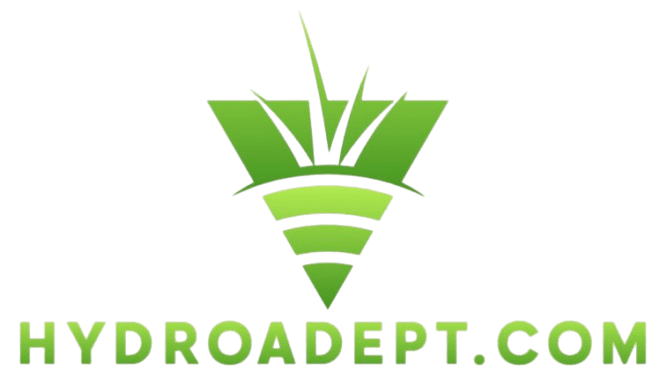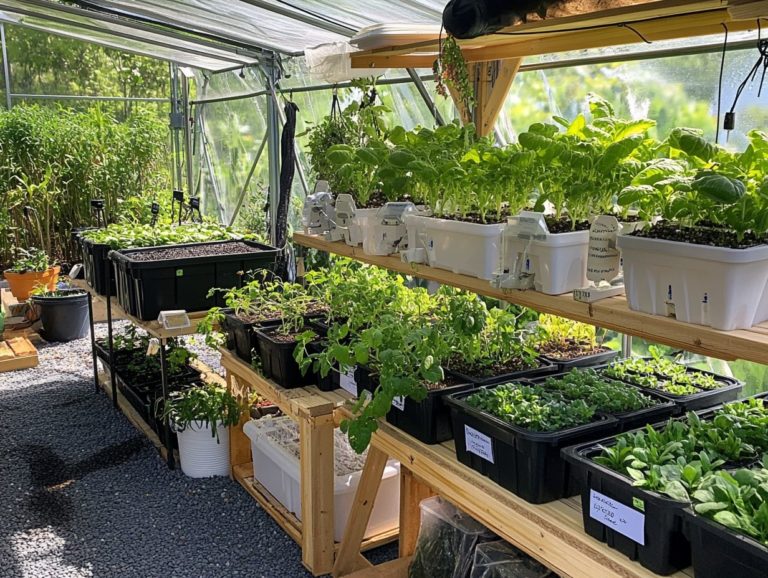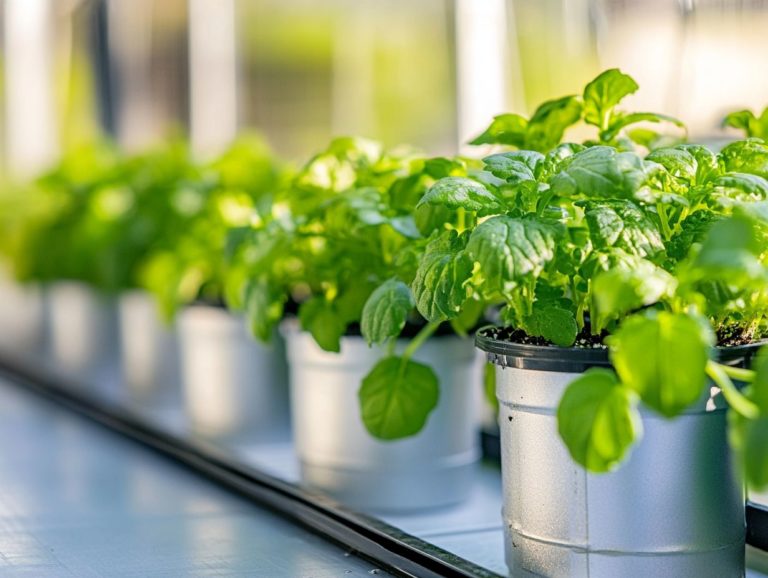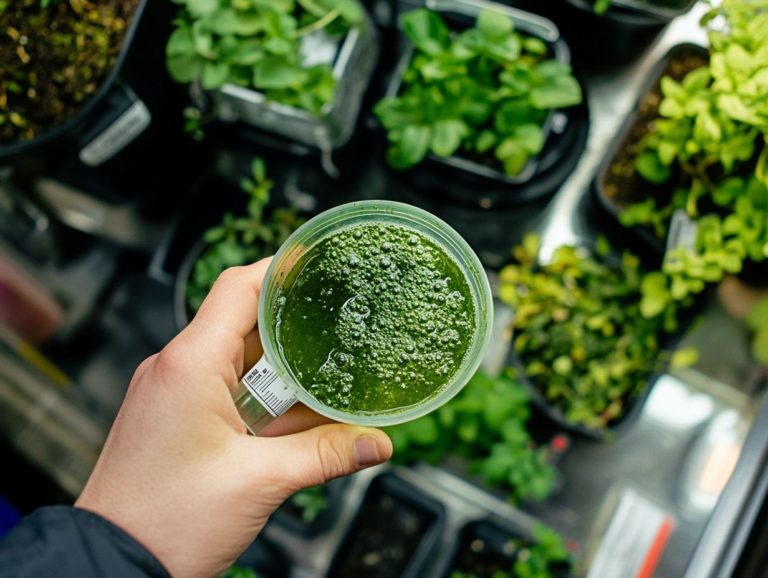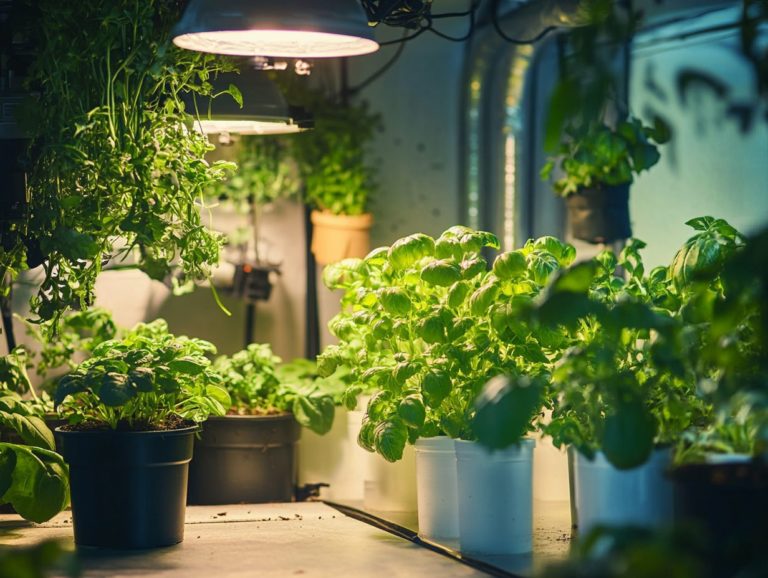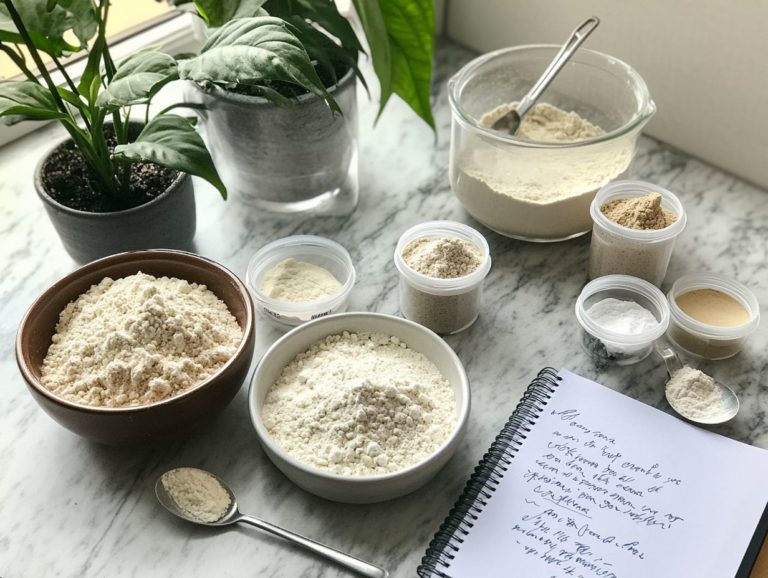The Best Nutrient Sources for Hydroponic Systems
In the realm of hydroponics, achieving the perfect nutrient balance is vital for your plants to thrive.
This guide covers the essential nutrients that drive optimal growth, highlighting the renowned trio of nitrogen, phosphorus, and potassium, alongside trace elements like boron and cobalt.
You ll find discussions on various nutrient solutions, valuable tips for maintaining that ideal balance, common pitfalls to avoid, and the finest organic sources for your hydroponic systems.
Whether you re a seasoned grower or just starting your hydroponic journey, get ready to unlock the secrets to hydroponic success!
Contents
- Key Takeaways:
- 1. Nitrogen
- 2. Phosphorus
- 3. Potassium
- 4. Calcium
- 5. Magnesium
- 6. Sulfur
- 7. Iron
- 8. Manganese
- 9. Boron
- 10. Zinc
- 11. Copper
- 12. Molybdenum
- 13. Silicon
- 14. Chlorine
- 15. Cobalt
- What Are the Different Types of Hydroponic Nutrient Solutions?
- Frequently Asked Questions
- What are the best nutrient sources for hydroponic systems?
- Do I need to use different nutrient sources for different stages of plant growth?
- Can I make my own nutrient solution for my hydroponic system?
- Are there any organic nutrient sources for hydroponic systems?
- Is it necessary to use pH balanced nutrient sources in hydroponic systems?
- How often should I change the nutrient solution in my hydroponic system?
Key Takeaways:
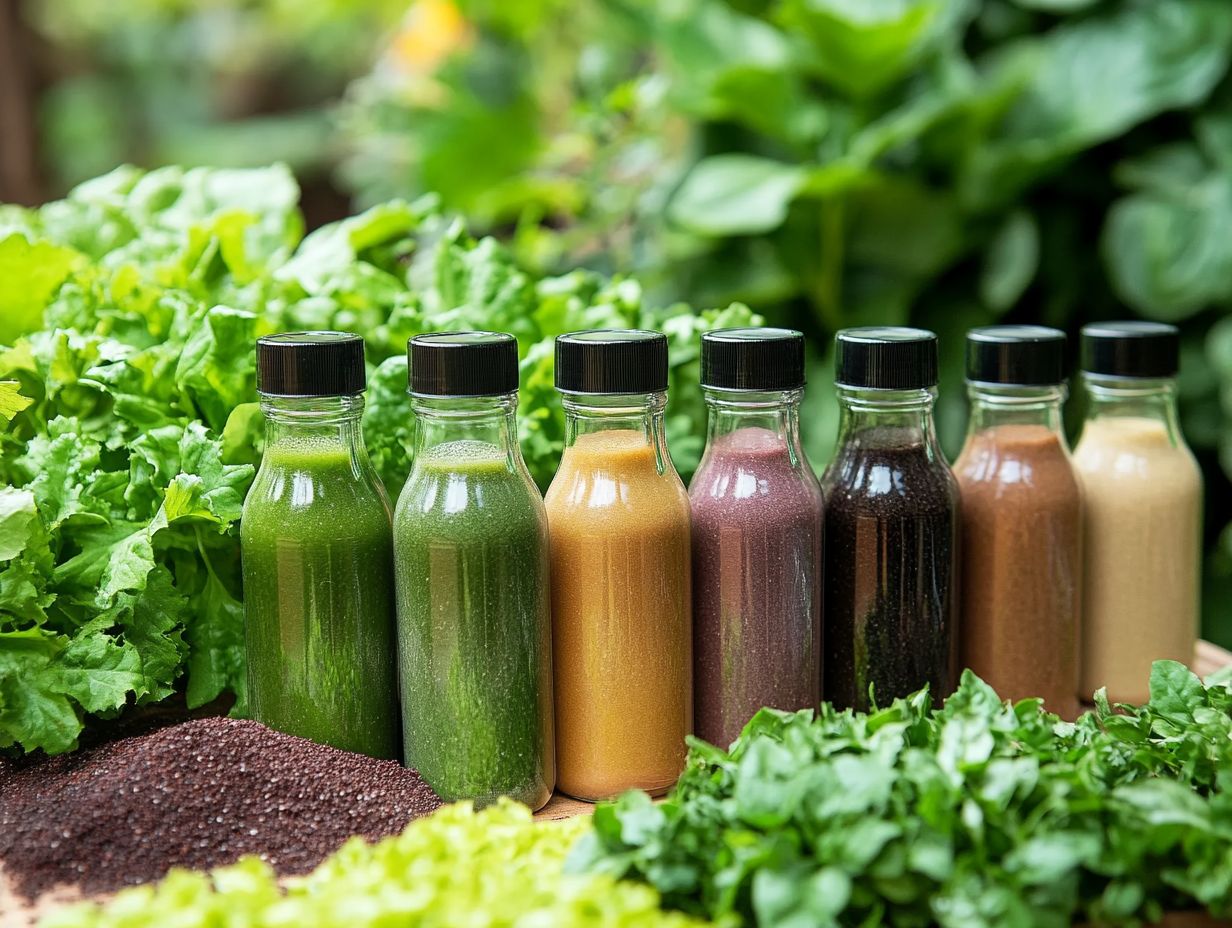
- Nitrogen, phosphorus, and potassium are critical for hydroponic systems.
- Calcium, magnesium, and sulfur are also important for plant health.
- Trace elements like iron and zinc enhance plant growth.
1. Nitrogen
Nitrogen is an essential nutrient in hydroponics, playing a pivotal role in your plants’ growth. It promotes lush foliage and robust root development.
Nitrogen is crucial for optimizing plant health and boosting yields. It supports photosynthesis and protein synthesis, ensuring that your plants receive the nutrients they need to thrive.
Understanding nitrogen’s significance can enhance food production efficiency, especially in commercial greenhouses where steady supply and resource management are vital.
When you maintain proper nitrogen levels, your plants efficiently convert light energy into chemical energy during photosynthesis, supporting their overall growth and vigor.
A deficiency in nitrogen can lead to stunted growth, yellowing leaves, and disappointing yields. Conversely, excessive nitrogen can interfere with the absorption of other essential nutrients like phosphorus and potassium.
To achieve a healthy balance, incorporate nitrogen alongside these elements to create a well-rounded nutrient profile.
Using testing kits specifically designed for hydroponic systems allows you to easily monitor nitrogen levels and ensure your plants receive the right amounts to flourish. This proactive approach helps avoid potential nutrient imbalances that could jeopardize overall plant health.
2. Phosphorus
Phosphorus is an essential nutrient in hydroponics that plays a key role in root development and overall plant vitality.
This vital element helps transfer energy within plant cells, particularly by aiding in the synthesis of ATP (adenosine triphosphate), the powerhouse that energizes various physiological processes. With the right amount of phosphorus, you ll notice robust root growth and enhanced flowering, leading to healthier yields.
A phosphorus deficiency can manifest as stunted growth, dark green or purplish leaves, and poor flower formation.
To avoid these pitfalls, use balanced nutrient solutions that incorporate trace minerals. Doing so ensures your plants not only thrive but also reach their full potential in any hydroponic setup.
3. Potassium
Potassium is an essential nutrient that plays a crucial role in regulating various physiological processes in your plants, including water efficiency and nutrient uptake.
This vital element contributes to the overall health of your plants and aids in photosynthesis, where it assists in nutrient movement and energy transfer necessary for growth.
Potassium activates enzymes integral to metabolism and enhances your plants’ ability to resist environmental stresses especially critical in hydroponic systems where conditions can be unpredictable.
To manage potassium levels effectively, regularly monitor and adjust nutrient solutions to ensure your plants receive the right amount and avoid deficiencies. Achieving this balance fosters robust growth and significantly improves your yields.
4. Calcium
Calcium is an essential nutrient in hydroponics. It plays a pivotal role in strengthening cell walls and facilitates crucial biochemical functions key to optimal plant growth.
Beyond fortifying the plant’s structure, this mineral is instrumental in root development and nutrient absorption. It acts as a signaling molecule, regulating vital processes such as cell division and elongation. When calcium levels are right, your roots efficiently absorb essential nutrients like potassium and magnesium, critical for overall plant health.
In hydroponic systems, calcium collaborates with other elements to create a symbiotic environment that prevents nutrient lockout and enhances efficiency. Maintaining appropriate calcium levels is absolutely essential for fostering healthy growth conditions and maximizing crop yields.
5. Magnesium
Magnesium is vital for your plants, especially in hydroponics, where its role in chlorophyll production is crucial for effective photosynthesis and overall health.
When you experience a deficiency in this element, you may notice stunted growth and yellowing leaves. Your plants may struggle to generate the energy necessary for their energy production.
To maintain optimal magnesium levels, act now to monitor through soil tests or water analysis. This proactive approach allows you to tailor your nutrient solutions to meet your plants’ specific needs.
Incorporating magnesium can be effectively achieved by using magnesium sulfate or chelated forms, which dissolve easily in water and are readily absorbed by your plants. This level of attentiveness enhances the overall health of your plants and maximizes productivity, leading to a bountiful harvest.
6. Sulfur
Sulfur is an essential nutrient that plays a pivotal role in supporting your plants’ metabolism, particularly in synthesizing amino acids and proteins in hydroponic systems.
This vital element is significant for chlorophyll formation, directly influencing your plants’ ability to photosynthesize and generate energy. Sulfur collaborates beautifully with other nutrients like nitrogen and phosphorus, boosting their effectiveness and availability.
To keep sulfur levels optimal in your hydroponic nutrient solutions, regularly monitor the pH and the ability of water to conduct electricity, as these factors affect nutrient uptake. Additionally, consider learning about the best vegetables for hydroponic gardening and incorporate specialized fertilizers that contain sulfate forms of sulfur to ensure a robust supply for healthy plant growth.
7. Iron
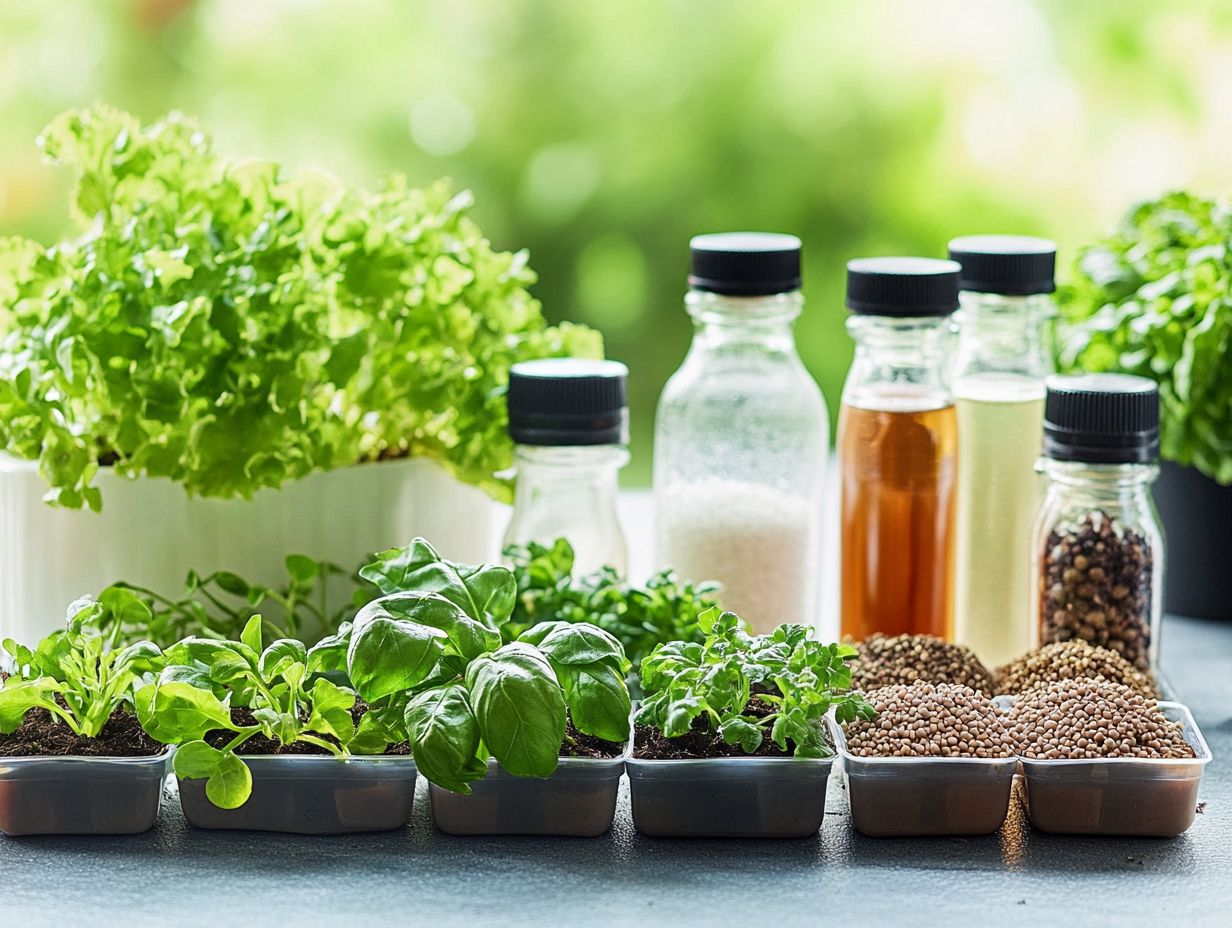
Iron is a vital trace mineral in hydroponics, integral to chlorophyll production and the overall health of your plants. It profoundly influences photosynthesis efficiency and nutrient uptake.
The importance of iron cannot be overstated; it plays a critical role in energy transfer within plants. This supports a range of metabolic processes essential for robust growth. When iron levels dip, your plants may display distress signals like yellowing leaves and stunted growth, hinting at deficiencies that could jeopardize their vitality.
To uphold optimal iron levels in your hydroponic system, consider incorporating chelated iron supplements. Consistently monitor the pH and nutrient concentrations in your solution. This proactive strategy guarantees that your plants can absorb iron efficiently, paving the way for vigorous growth and a bountiful harvest, while also understanding the role of micronutrients in hydroponics.
8. Manganese
Manganese is an essential trace mineral in hydroponics. It plays a vital role in photosynthesis and helps produce crucial enzymes for thriving plant growth.
If your plants lack manganese, you might see symptoms like yellowing leaves, stunted growth, and diminished yields. These issues often arise from low manganese levels in your nutrient solution or imbalances with other elements.
To diagnose manganese deficiency, observe your plants closely and conduct tissue tests to check nutrient levels. Adjust your nutrient solution to ensure optimal manganese availability or use manganese supplements if necessary. Regular monitoring and adjustments are key to maintaining plant health and maximizing yields.
9. Boron
Boron is a vital trace mineral in hydroponics. It plays an essential role in cell wall formation and reproductive growth, directly influencing your plants’ overall health and yield.
This element also aids in the uptake of other important nutrients, such as nitrogen, phosphorus, and potassium, ensuring your plants have what they need to thrive. Don’t overlook boron’s role in sugar transport and the synthesis of nucleic acids, as it directly impacts flowering and fruiting processes.
Take charge of your boron levels today for healthier plants! Regularly monitor your nutrient solutions using specialized testing kits, and adjust your formulations based on the readings to maintain optimal concentrations. This will help your plants produce more flowers and fruits.
10. Zinc
Zinc is a key mineral for plant health. It helps drive growth and development, especially when balancing nutrients like calcium and magnesium.
This mineral is involved in protein synthesis, which is essential for forming significant compounds like chlorophyll that optimize metabolism and photosynthesis. Zinc also regulates various growth hormones, supporting robust root and shoot development.
To maintain adequate zinc levels, conduct regular tests on your nutrient solutions to ensure they meet the needs of your specific plant species. By using bioavailable zinc sources, such as zinc sulfate or chelated zinc, you can significantly reduce the risk of deficiencies and help your plants thrive.
11. Copper
Copper is a trace mineral essential for your plants’ metabolism. It plays a key role in enzyme function and chlorophyll synthesis in hydroponic gardening.
This vital micronutrient helps plants efficiently convert sunlight into energy and supports important processes like photosynthesis and respiration. In a hydroponic system, it s crucial to maintain optimal copper levels; deficiencies can result in stunted growth, poor leaf development, and diminished yield.
Regular testing of your nutrient solutions is essential. By monitoring copper concentrations, you can make timely adjustments. Stabilizing copper levels, along with other key elements like nitrogen and phosphorus, enhances plant health and boosts the efficiency of your hydroponic setup. For more information on what nutrients are essential for hydroponics, be sure to explore the available resources.
12. Molybdenum
Molybdenum is a trace mineral that plays an important role in nitrogen metabolism and amino acid synthesis in plants. It helps ensure that your hydroponic systems effectively utilize macronutrients and micronutrients.
This mineral is important for converting nitrates into forms that plants can readily absorb. This directly influences their growth and overall health. When molybdenum levels are insufficient, you may notice stunted growth and yellowing leaves clear indicators of poor nitrogen utilization.
Be sure to monitor your nutrient solutions for molybdenum regularly! Keeping it in the right range of 0.01 to 0.1 ppm can make all the difference for your plants. Incorporating fertilizers rich in molybdenum ensures your plants receive the nutrition they need, promoting robust root systems and enhancing crop yields.
13. Silicon
Silicon is gaining recognition in hydroponics for its important role in enhancing plant resilience against stressors while boosting overall growth and yield, especially when integrated with environmentally friendly nutrient solutions.
Silicon strengthens cell walls. This makes plants less prone to damage and promotes improved disease resistance, enabling them to fend off pathogens more effectively.
By incorporating silicon into your nutrient solutions, you’ll likely notice a significant increase in stress tolerance, particularly during challenging conditions like drought or nutrient deficiencies.
You have many exciting options! From silicon-rich fertilizers to simple amendments, you can boost your plants’ health and productivity. Embracing silicon supplementation can lead to more robust plants, resulting in higher yields and premium-quality produce.
14. Chlorine
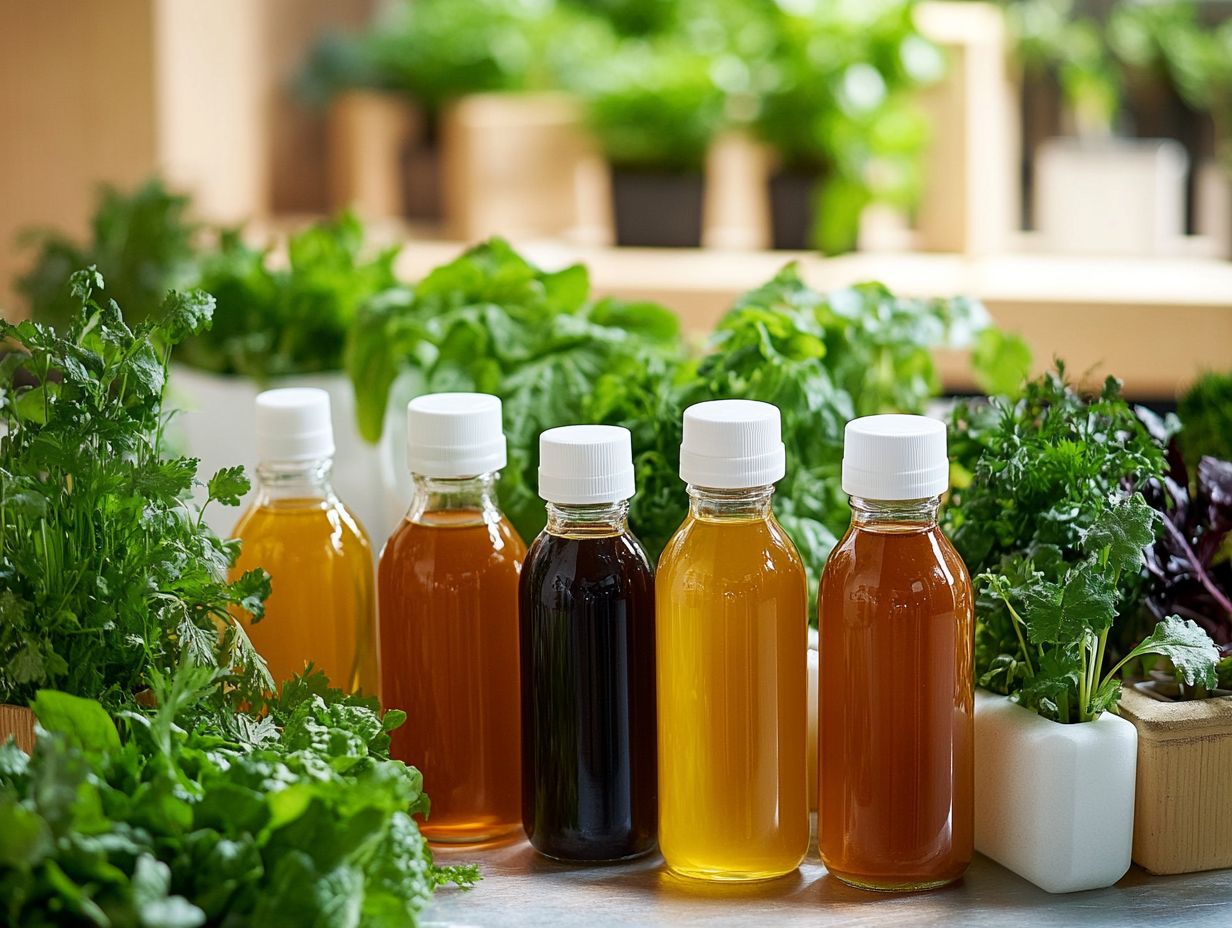
Chlorine plays a subtle yet vital role in your plant’s growth, particularly in hydroponics. It aids in osmosis and the transport of essential nutrients, ensuring an optimal nutrient balance for healthy roots and plants.
While often overlooked, this element is important for maintaining a proper electrolyte balance within your plants. It helps regulate stomatal conductance and overall transpiration. Chlorine participates in various biochemical pathways, enhancing photosynthesis and offering protection against pathogens.
Regularly check your nutrient solutions for chlorine levels. Make adjustments as needed, whether through the application of chloride salts or specially formulated nutrient solutions. For a deeper understanding, refer to understanding nutrients for DIY hydroponic systems. Striking the right balance is essential, as both deficiencies and excesses can compromise plant health and hinder optimal growth.
15. Cobalt
Cobalt is a trace mineral that’s essential for nitrogen fixation the process of converting nitrogen from the air so plants can use it and overall plant health. This is particularly true for crops thriving in hydroponic systems, making it a key component of both premade solutions and homemade nutrient mixes.
This vital nutrient enhances your plants’ capacity to absorb other essential nutrients effectively. Cobalt also plays a role in the formation of vitamin B12, which is pivotal for the metabolic processes that allow your plants to flourish.
To ensure optimal cobalt levels, you can easily monitor its concentration through regular testing of your nutrient solution. Use specialized kits designed to measure trace elements. Adjusting the concentration according to your plants’ needs boosts their growth and prevents deficiencies that could impede productivity.
What Are the Different Types of Hydroponic Nutrient Solutions?
In hydroponics, choosing the right nutrient solutions like nitrogen, phosphorus, and potassium is vital for healthy plant growth. You can select from convenient premade solutions or create customized homemade mixes tailored to your crops.
Selecting the right nutrient solution can dramatically influence your yields and the overall vitality of your plants. While premade solutions offer ease of use and are often tailored to common plants, they come with a higher price tag and may lack the customization you desire, especially regarding large and small nutrients. Using nutrient solutions in different growing systems allows for precise control over nutrient content based on specific crop needs, though they require a deeper understanding of plant nutrition.
Using testing kits can revolutionize your approach to managing nutrient levels! These kits provide instant feedback on pH levels and nutrient concentrations, allowing you to fine-tune your formulas to include critical elements like calcium and iron. This proactive approach promotes robust growth and significantly higher yields.
How Can One Ensure Proper Nutrient Balance in a Hydroponic System?
To keep your plants thriving, it s crucial to maintain a proper nutrient balance in your hydroponic system. Regularly check the electrical conductivity (EC) a measure of how well your nutrient solution can conduct electricity, indicating nutrient levels and pH levels, especially for essential nutrients like magnesium and manganese.
Consistently checking pH levels ensures that nutrients are available to your plants since improper pH can hinder nutrient uptake.
Recognizing that the availability of different nutrients fluctuates with the pH of the solution is vital. This directly impacts plant health and growth. Establishing a routine for testing and adjusting pH and EC promotes vigorous growth and prevents deficiencies and toxicities in a dynamic hydroponic environment.
What Are the Common Mistakes in Nutrient Management for Hydroponic Systems?
Many hydroponic growers encounter common mistakes in nutrient management that can lead to significant deficiencies and compromised plant health, particularly when they overlook the importance of trace elements.
Often, growers over-fertilize, thinking that more nutrients will lead to better growth. However, excessive nutrient levels can result in toxicity, harming delicate root systems, especially when adjusting pH levels is neglected.
To avoid these pitfalls, regularly test your nutrient solutions and maintain optimal pH levels, typically between 5.5 and 6.5. A nutrient management plan focusing on gradual adjustments and environmentally friendly practices can foster steady plant development and overall wellness, especially when you consider the best herbs for hydroponics.
What Are the Best Sources of Nutrients for Organic Hydroponic Systems?
Organic hydroponic systems require careful attention when selecting nutrient sources, including nitrogen, phosphorus, and potassium, to ensure the health of your plants. Utilize homemade nutrient mixes and organic fertilizers rich in essential trace minerals for the best results.
Consider incorporating compost teas, worm castings, and seaweed extracts into your system. Each of these sources offers unique benefits that enhance plant vitality. Compost teas are packed with beneficial microbes and provide a diverse nutrient profile, creating a flourishing root environment. Worm castings deliver a nutrient-dense punch, offering a slow release of essential minerals. Meanwhile, seaweed extracts are rich in growth hormones that promote robust plant development. For a deeper understanding of how to optimize your nutrients, check out understanding hydroponic nutrient solutions.
Formulating your own homemade nutrients can be straightforward. By mixing various organic materials, you can create balanced solutions tailored to your plants’ specific needs. For those looking to explore different methods, consider the top hydroponic systems and their nutrient needs. This approach grants you greater control over nutrient levels and encourages sustainable, eco-friendly gardening practices.
How Can One Troubleshoot Nutrient Deficiencies in a Hydroponic System?
Troubleshooting nutrient deficiencies in your hydroponic system demands sharp observation and an understanding of plant symptoms, enabling you to adjust your nutrient solutions effectively.
Recognizing that each deficiency reveals itself through distinct signs like yellowing leaves, stunted growth, or discoloration of stems is crucial. These indicators signal that your plants are lacking essential elements.
Regularly monitor your plants to diagnose issues accurately. Consider conducting leaf tissue tests (tests that check the nutrient levels in leaves) or analyzing the acidity levels of your nutrient solution.
Once you pinpoint a deficiency, you can try methods like adjusting nutrient concentrations, tweaking acidity levels, or even utilizing nutrient solutions applied directly to leaves. By ensuring your growing medium maintains the right balance of elements, you enhance overall nutrient availability, fostering healthier and more productive plants.
Frequently Asked Questions

What are the best nutrient sources for hydroponic systems?
The best nutrient sources for hydroponic systems provide a balanced mix of essential minerals and trace elements. This includes fertilizers specifically designed for hydroponics, as well as natural sources such as fish emulsion, compost tea, and seaweed extract.
Do I need to use different nutrient sources for different stages of plant growth?
Yes! Use different nutrient sources for different stages of plant growth. During the vegetative stage, plants require a higher ratio of nitrogen to support leaf and stem growth. During the flowering stage, they need a higher ratio of phosphorus and potassium to support flower and fruit development.
Can I make my own nutrient solution for my hydroponic system?
Absolutely! You can create your own nutrient solution using a recipe that includes a balance of essential minerals and trace elements. Regularly test and adjust the solution to ensure it provides all the necessary nutrients for your plants.
Are there any organic nutrient sources for hydroponic systems?
Yes! Several organic nutrient sources are suitable for hydroponic systems, including fish emulsion, compost tea, and seaweed extract. Be sure to check the ingredients to ensure they are appropriate for hydroponic use.
Is it necessary to use pH balanced nutrient sources in hydroponic systems?
Yes! Maintaining proper pH levels is crucial in hydroponic systems. Use nutrient sources designed to be pH balanced, ensuring your plants can properly absorb the nutrients they need for healthy growth.
How often should I change the nutrient solution in my hydroponic system?
The frequency of changing the nutrient solution depends on factors like plant type, system size, and water quality. Generally, it is recommended to change the solution every 1-2 weeks to prevent nutrient deficiencies and maintain a healthy root environment.
